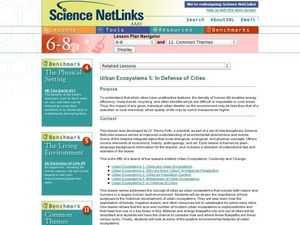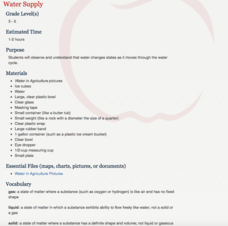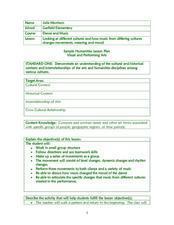Curated OER
States of Matter
Learners explore the states of matter. They discuss the different phrases of matter and categorize everyday substances as solids, liquids, or gases. Students explore the relationship between the phases on an atomic level and the role of...
Curated OER
Lunar Learning
Students learn about the phases of the moon. In this moon phases lesson plan, students learn about what causes the moon to look different to us everyday and how the Earth and Sun's position determine what phase the moon is in.
Curated OER
Sometimes, solid + liquid = gas
Third graders experiment with common household liquids and solids. In this chemical reaction lesson, 3rd graders discuss phase changes and experiment to find other ways to create gases. They use water, vinegar, lemon juice, flour, baking...
Curated OER
Water and Ice
Students investigate what happens to solids and liquids when they change from one form to another. The amount od space taken by frozen water begins the discussion and students are led to formulate their own hypothesis to research.
Curated OER
Investigating Transformations
In this trigonometry worksheet, students investigate the transformations that can occur to the basic trigonometric functions. The thirteen page worksheet contains explanation, examples, and forty-seven questions. Answers are not included.
Curated OER
Matter And Its Changes
Fifth graders explore the phases of matter, make observations of matter, the physical and chemical properties of matter, solutions and mixtures, formation of molecules and atoms and molecules all through hands on activities.
Lunar and Planetary Institute
Moon Flip Book
Watch an entire month flash before your eyes with this fun phases-of-the-moon flip book activity.
American Museum of Natural History
Moon Flip Book
Flip over the phases of the moon. Using an interactive, pupils view the location of the moon relative to the sun and earth for the eight major phases of the moon. Individuals record how the moon looks through a complete cycle. Using...
University of Texas
Observing the Moon
Why does it look like there is a man on the moon? Why does the moon look different every night? These are the focus questions of a lesson that prompts class members to observe and record the nightly changes of Earth's natural satellite.
Columbus City Schools
What’s Up with Matter?
Take a "conservative" approach to planning your next unit on mass and matter! What better way to answer "But where did the gas go?" than with a lab designed to promote good report writing, research skills, and detailed observation. The...
Discovery Education
It's Melting!
It's a race to the finish! Which ice cube will melt the fastest? Scholars discover the effect thermal energy has on melting ice. They experiment with melting ice cubes on different materials and learn that even at a consistent...
Discovery Education
Cool It!
Adjust the melting time of ice without varying the temperature! Learners experiment with different materials to decide how the materials affect the rate an ice cube melts. They then connect their findings to the conductivity of each...
National Institute of Food and Agriculture
Water Supply
Participate in three activities that look at the earth's limited water supply and the changes water goes through as it enters each phase of the water cycle. The resource is complete with three activities that demonstrate the changing...
Curated OER
Investigation: Evaporation
An evaporation investigation! This collection of slides walks future scientists through the process of setting up an experiment on how to speed up evaporation. The experiment is simple enough to use at the beginning of the school year to...
Rice University
College Physics for AP® Courses
Take a look at an organized physics course. The 34-section electronic textbook covers material in AP® Physics 1 and 2. Teachers use the text to supplement lectures and have the class work through the labs. Each section contains multiple...
Curated OER
What's the Matter with My Snow?
Students collect snow samples around their school. They explore the concepts of density and phase change as well as the math skills of measurement and statistics. Students explore the water cycle through an interactive, down loadable...
Curated OER
Rock Candy Crystals
Students discover how rocks are created. In this rock formation lesson, students investigate saturation, evaporation, and phase changes in geology. Students create rock candy from skewers, string, boiling water and sugar.
Curated OER
Kitchen Chemistry
Fifth graders examine both physical and chemical changes, and how to identify the difference between the two. They observe the changes that occur in butter when it is exposed to heat and cold, heat energy. In their notebooks, they write...
Curated OER
A Chemical Curiosity
In this chemical change worksheet, students review physical changes such as evaporation and condensation before working with chemical change. They conduct an experiment with vinegar and baking soda before recording the chemical changes...
K12 Reader
Phases of the Moon
Take one giant leap for mankind with a reading passage about the moon. Kids learn about the lunar cycle with context clues and reading comprehension questions, making it a good informational text for your language arts lesson.
Curated OER
Looking at different cultures and how music from differing cultures changes movements, meaning and mood
Each of the three dance lessons included here will get your class moving. The first lesson allows learners to explore how music and movement differ in meaning depending on cultural context. Lesson two gives them an opportunity to create...
Curated OER
Confused and Misused Words and Phases
This grammar lesson will definitely help your students ace the next skills evaluation. Provided are several examples of words that are commonly misused, confused, or misspelled. Five different strategies are given to help students avoid...
Science Friday
Sublime Sublimation
Dry ice isn't dehydrated water, and young scientists learn why in this fascinating presentation. After watching a video, they complete three different activities using dry ice. Upon completion, they discuss the scientific principle.
EngageNY
Grade 9 ELA Module 4, Unit 1, Lesson 6
How do writers create a specific tone in their text? As class members continue their study of Sugar Changed the World, they focus on the words and phrases that Aronson and Budhos use to create that tone in their descriptions of arduous...
Other popular searches
- Phase Changes of Matter
- Phase Changes in Matter
- Phase Changes in Water
- Chemistry Phase Changes
- Phase Changes of Water
- Water Phase Changes
- Phase Changes Matter
- Lessons on Phase Changes
- Identify Phase Changes

























